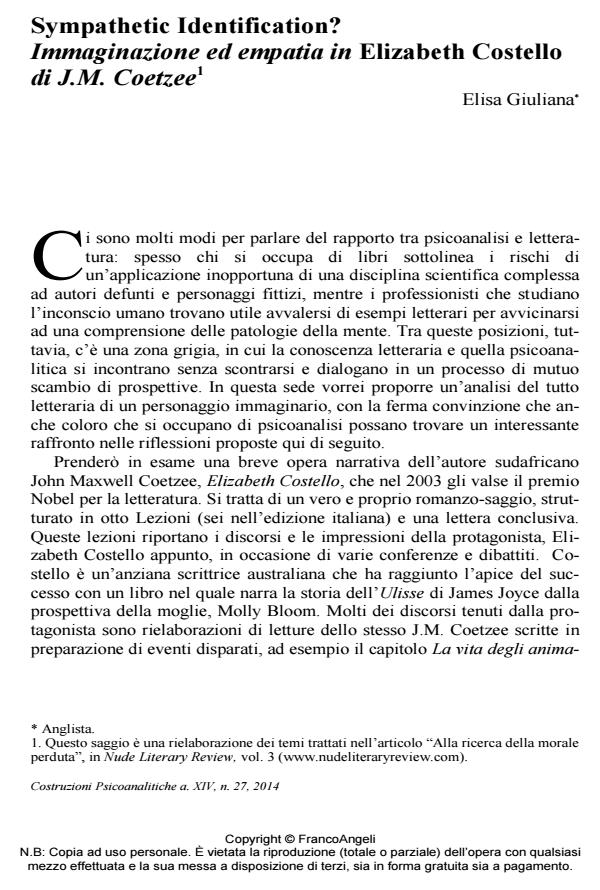Sympathetic Identification? Immaginazione ed empatia in Elizabeth Costello di J.M. Coetzee
Journal title COSTRUZIONI PSICOANALITICHE
Author/s Elisa Giuliana
Publishing Year 2014 Issue 2014/27
Language Italian Pages 15 P. 101-115 File size 240 KB
DOI 10.3280/COST2014-027008
DOI is like a bar code for intellectual property: to have more infomation
click here
Below, you can see the article first page
If you want to buy this article in PDF format, you can do it, following the instructions to buy download credits

FrancoAngeli is member of Publishers International Linking Association, Inc (PILA), a not-for-profit association which run the CrossRef service enabling links to and from online scholarly content.
Sometimes a novel can tackle themes that are relevant to psychoanalysis. This is the case with Elizabeth Costello34, a short book that takes the middle ground between a novel and an essay, and which in 2003 won its author J.M. Coetzee the Nobel Prize for Literature. This work deals with the concepts of imagination, sympathy and projective identification through the reflection of its protagonist, the ageing writer Elizabeth Costello, who has been asked to give talks at various conferences and symposia. In the present study, we analyze some excerpts from the book in detail, especially Elizabeth’s claim that we possess an imaginative faculty that goes beyond the limits of human reasoning. This ability allows us to reach a complete and absolute knowledge of any other living creature - a knowledge, that is, which does not imply any oppression or colonization of the other. Using what she calls ‘the sympathetic imagination’, we can experience an objective and respectful knowledge of living beings that are different from us in terms of race, gender, and even species. Costello is firmly convinced of the existence of this faculty, that lies between imagination and sympathy, allowing us to fully understand what it means to be another living creature - to live like it, to feel like it and to experience reality like it. The most striking example of this is her consideration of the question posited by philosopher of the mind Thomas Nagel, who asked ‘What Is It Like to Be a Bat?’35 and came to the conclusion that the human mind is too different from a bat’s mind, so we can never fully know what it means to be a bat. Elizabeth Costello is of the opposite opinion, but her theories seem not to be supported by the author. On the contrary, Coetzee undermines her thought process through a series of subtle narrative strategies which make her solid statements seem uncertain and unreliable. Moreover, we will see that Costello is not able to put her concept of sympathy into practice in real life; rather, she manifests a deep inability to relate to others and a constant need to control the people that are close to her. Finally, we will analyse the final chapter of the book, in which the main character suddenly abandons her convictions and admits to not believing in anything. We will show how, in the narrative landscape of Coetzee’s works, the awareness of the failure to reach an absolute knowledge of the other seems to be the only possible foundation for an approach to the other that is free from any oppression.
Keywords: J.M. Coetzee, Elizabeth Costello, sympathetic imagination, sympathy, projective identification, knowledge of the other, postcolonial literature.
Elisa Giuliana, Sympathetic Identification? Immaginazione ed empatia in Elizabeth Costello di J.M. Coetzee in "COSTRUZIONI PSICOANALITICHE" 27/2014, pp 101-115, DOI: 10.3280/COST2014-027008